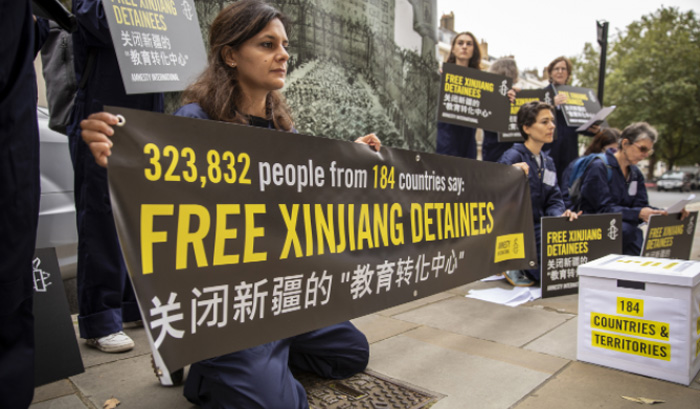Amnesty Calls For Action On Rights In China’s Xinjiang
Amnesty International decried Thursday the “woefully inadequate” international response after the UN released a bombshell report last year detailing a litany of abuses in China’s Xinjiang province.
On the first anniversary of the report, Amnesty lamented that the international community, including parts of the United Nations, had “shied away from the kind of resolute steps needed to advance justice, truth and reparation for victims.”
The rights group singled out UN rights chief Volker Turk for failing to “clearly emphasize the urgent need for accountability for (China’s) alarming violations.”
His predecessor Michelle Bachelet released her long-delayed report on the situation in Xinjiang on August 31, 2022, just minutes before her term ended, after facing significant pressure from Beijing to withhold the document.
It detailed a string of violations against Uyghurs and other Muslim minorities in Xinjiang, urging the world to pay “urgent attention” to the human rights situation in the far-western region.
The report — harshly criticized by Beijing — highlighted “credible” allegations of widespread torture, arbitrary detention and violations of religious and reproductive rights.
And it brought UN endorsement to long-running allegations that Beijing had detained of detaining more than one million Uyghurs and other Muslims and forcibly sterilized women, with possible crimes against humanity.
But UN Human Rights Council member states last October narrowly voted to reject even holding a debate on its contents.
Turk, the UN high commissioner for human rights, has vowed to “personally continue engaging with the (Chinese) authorities” about the rights violations detailed in the report.
But Amnesty complained that his public follow-up had so far been lacking.
“We need national and international officials, including human rights officials such as the high commissioner, to use all levers at their disposal … to seek meaningful change in China’s repressive policies,” said Sarah Brooks, Amnesty’s deputy regional director for China.
They should, she said, be “engaging in frank, evidence-based dialogue with the authorities about their human rights violations.”
Brooks highlighted that the anniversary of the report’s release came the same week as Chinese President Xi Jinping made a surprise visit to Xinjiang’s regional capital Urumqi, where he called for more curbs on “illegal religious activities.”
“The one-year anniversary of the (UN) report must be a call to action,” she said, stressing the urgent need for an independent international investigation into violations in Xinjiang.
“Families of those who have been arbitrarily detained, forcibly disappeared or mistreated want and deserve answers and accountability, not delays and compromises.”

